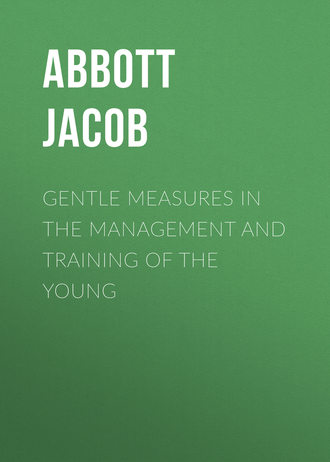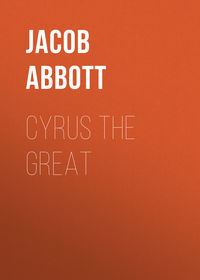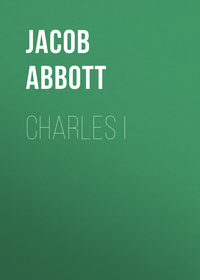
Gentle Measures in the Management and Training of the Young
For example, let us suppose that the father and mother are taking a ride on a summer afternoon after a shower, with little Johnny sitting upon the seat between them in the chaise. The parents are engaged in conversation with each other, we will suppose, and would not like to be interrupted. Johnny presently spies a rainbow on a cloud in the east, and, after uttering an exclamation of delight, asks his mother what made the rainbow. She hears the question, and her mind, glancing for a moment at the difficulty of giving an intelligible explanation of so grand a phenomenon to such a child, experiences an obscure sensation of perplexity and annoyance, but not quite enough to take off her attention from her conversation; so she goes on and takes no notice of Johnny's inquiry. Johnny, accordingly, soon repeats it, "Mother! mother! what makes the rainbow?"
At length her attention is forced to the subject, and she either tells Johnny that she can't explain it to him—that he is not old enough to understand it; or, perhaps, scolds him for interrupting her with so many teasing questions.
In another such case, the mother, on hearing the question, pauses long enough to look kindly and with a smile of encouragement upon her face towards Johnny, and to say simply, "The sun," and then goes on with her conversation. Johnny says "Oh!" in a tone of satisfaction. It is a new and grand idea to him that the sun makes the rainbow, and it is enough to fill his mind with contemplation for several minutes, during which his parents go on without interruption in their talk. Presently Johnny asks again,
"Mother, how does the sun make the rainbow?"
His mother answers in the same way as before, "By shining on the cloud:" and, leaving that additional idea for Johnny to reflect upon and receive fully into his mind, turns again to her husband and resumes her conversation with him after a scarcely perceptible interruption.
Johnny, after having reflected in silence some minutes, during which he has looked at the sun and at the rainbow, and observed that the cloud on which the arch is formed is exactly opposite to the sun, and fully exposed to his beams, is prepared for another step, and asks,
"Mother, how does the sun make a rainbow by shining on the cloud?"
His mother replies that it shines on millions of little drops of rain in the cloud, and makes them of all colors, like drops of dew on the ground, and all the colors together make the rainbow.
Here are images presented to Johnny's mind enough to occupy his thoughts for a considerable interval, when perhaps he will have another question still, to be answered by an equally short and simple reply; though, probably, by this time his curiosity will have become satisfied in respect to his subject of inquiry, and his attention will have been arrested by some other object.
To answer the child's questions in this way is so easy, and the pauses which the answers lead to on the part of the questioner are usually so long, that very little serious interruption is occasioned by them to any of the ordinary pursuits in which a mother is engaged; and the little interruption which is caused is greatly overbalanced by the pleasure which the mother will experience in witnessing the gratification and improvement of the child, if she really loves him, and is seriously interested in the development of his thinking and reasoning powers.
Answers should attempt to communicate but little Instruction3. The answers which are given to children should not only be short and simple in form, but each one should be studiously designed to communicate as small an amount of information as possible.
This may seem, at first view, a strange idea, but the import of it simply is that, in giving the child his intellectual nourishment, you must act as you do in respect to his bodily food—that is, divide what he is to receive into small portions, and administer a little at a time. If you give him too much at once in either case, you are in danger of choking him.
For example, Johnny asks some morning in the early winter, when the first snow is falling, and he has been watching it for some time from the window in wonder and delight, "Mother, what makes it snow?" Now, if the mother imagines that she must give any thing like a full answer to the question, her attention must be distracted from her work to enable her to frame it; and if she does not give up the attempt altogether, and rebuke the boy for teasing her with "so many silly questions," she perhaps suspends her work, and, after a moment's perplexing thought, she says the vapor of the water from the rivers and seas and damp ground rises into the air, and there at last congeals into flakes of snow, and these fall through the air to the ground.
The boy listens and attempts to understand the explanation, but he is bewildered and lost in the endeavor to take in at once this extended and complicated process—one which is, moreover, not only extended and complicated, but which is composed of elements all of which are entirely new to him.
If the mother, however, should act on the principle of communicating as small a portion of the information required as it is possible to give in one answer, Johnny's inquiry would lead, probably, to a conversation somewhat like the following, the answers on the part of the mother being so short and simple as to require no perceptible thought on her part, and so occasioning no serious interruption to her work, unless it should be something requiring special attention.
"Mother," asks Johnny, "what makes it snow?"
"It is the snow-flakes coming down out of the sky," says his mother. "Watch them!"
"Oh!" says Johnny, uttering the child's little exclamation of satisfaction. He looks at the flakes as they fall, catching one after another with his eye, and following it in its meandering descent. He will, perhaps, occupy himself several minutes in silence and profound attention, in bringing fully to his mind the idea that a snow-storm consists of a mass of descending flakes of snow falling through the air. To us, who are familiar with this fact, it seems nothing to observe this, but to him the analyzing of the phenomenon, which before he had looked upon as one grand spectacle filling the whole sky, and only making an impression on his mind by its general effect, and resolving it into its elemental parts of individual flakes fluttering down through the air, is a great step. It is a step which exercises his nascent powers of observation and reflection very deeply, and gives him full occupation for quite a little interval of time. At length, when he has familiarized himself with this idea, he asks again, perhaps,
"Where do the flakes come from, mother?"
"Out of the sky."
"Oh!" says Johnny again, for the moment entirely satisfied.
One might at first think that these words would be almost unmeaning, or, at least, that they would give the little questioner no real information. But they do give him information that is both important and novel. They advance him one step in his inquiry. Out of the sky means, to him, from a great height. The words give him to understand that the flakes are not formed where they first come into his view, but that they descend from a higher region. After reflecting on this idea a moment, he asks, we will suppose,
"How high in the sky, mother?"
Now, perhaps, a mother might think that there was no possible answer to be given to such a question as this except that "she does not know;" inasmuch as few persons have any accurate ideas of the elevation in the atmosphere at which snow-clouds usually form. But this accurate information is not what the child requires. If the mother possessed it, it would be useless for her to attempt to communicate it to him. In the sense in which he asks the question she does understand it, and can give him a perfectly satisfactory answer.
"How high is it in the sky, mother, to where the snow comes from?" asks the child.
"Oh, very high—higher than the top of the house," replies the mother.
"As high as the top of the chimney?"
"Yes, higher than that."
"As high as the moon?"
"No, not so high as the moon."
"How high is it then, mother?"
"About as high as birds can fly."
"Oh!" says Johnny, perfectly satisfied.
The answer is somewhat indefinite, it is true, but its indefiniteness is the chief element in the value of it. A definite and precise answer, even if one of that character were ready at hand, would be utterly inappropriate to the occasion.
An Answer may even be good which gives no Information at all4. It is not even always necessary that an answer to a child's question should convey any information at all. A little conversation on the subject of the inquiry, giving the child an opportunity to hear and to use language in respect to it, is often all that is required.
It must be remembered that the power to express thoughts, or to represent external objects by language, is a new power to young children, and, like all other new powers, the mere exercise of it gives great pleasure. If a person in full health and vigor were suddenly to acquire the art of flying, he would take great pleasure in moving, by means of his wings, through the air from one high point to another, not because he had any object in visiting those high points, but because it would give him pleasure to find that he could do so, and to exercise his newly acquired power. So with children in their talk. They talk often, perhaps generally, for the sake of the pleasure of talking, not for the sake of what they have to say. So, if you will only talk with them and allow them to talk to you about any thing that interests them, they are pleased, whether you communicate to them any new information or not. This single thought, once fully understood by a mother, will save her a great deal of trouble in answering the incessant questions of her children. The only essential thing in many cases is to say something in reply to the question, no matter whether what you say communicates any information or not.
If a child asks, for instance, what makes the stars shine so, and his mother answers, "Because they are so bright," he will be very likely to be as well satisfied as if she attempted to give a philosophical explanation of the phenomenon. So, if he asks what makes him see himself in the looking-glass, she may answer, "You see an image of yourself there. They call it an image. Hold up a book and see if you can see an image of that in the glass too." He is pleased and satisfied. Nor are such answers useless, as might at first be supposed. They give the child practice in the use of language, and, if properly managed, they may be made the means of greatly extending his knowledge of language and, by necessary consequence, of the ideas and realities which language represents.
"Father," says Mary, as she is walking with her father in the garden, "what makes some roses white and some red?" "It is very curious, is it not?" says her father. "Yes, father, it is very curious indeed. What makes it so?" "There must be some cause for it" says her father. "And the apples that grow on some trees are sweet, and on others they are sour. That is curious too." "Yes, very curious indeed," says Mary. "The leaves of trees seem to be always green," continues her father, "though the flowers are of various colors." "Yes, father," says Mary. "Except," adds her father, "when they turn yellow, and red, and brown, in the fall of the year."
A conversation like this, without attempting any thing like an answer to the question with which it commenced, is as satisfactory to the child, and perhaps as useful in developing its powers and increasing its knowledge of language, as any attempt to explain the phenomenon would be; and the knowledge of this will make it easy for the mother to dispose of many a question which might seriously interrupt her if she conceived it necessary either to attempt a satisfactory explanation of the difficulty, or not to answer it at all.
Be always ready to say "I don't know."5. The mother should be always ready and willing to say "I don't know," in answer to children's questions.
Parents and teachers are very often somewhat averse to this, lest, by often confessing their own ignorance, they should lower themselves in the estimation of their pupils or their children. So they feel bound to give some kind of an explanation to every difficulty, in hopes that it may satisfy the inquirer, though it does not satisfy themselves. But this is a great mistake. The sooner that pupils and children understand that the field of knowledge is utterly boundless, and that it is only a very small portion of it that their superiors in age and attainment have yet explored, the better for all concerned. The kind of superiority, in the estimation of children, which it is chiefly desirable to attain, consists in their always finding that the explanation which we give, whenever we attempt any, is clear, fair, and satisfactory, not in our being always ready to offer an explanation, whether satisfactory or not.
Questions on Religious SubjectsThe considerations presented in this chapter relate chiefly to the questions which children ask in respect to what they observe taking place around them in external nature. There is another class of questions and difficulties which they raise—namely, those that relate to religious and moral subjects; and to these I have not intended now to refer. The inquiries which children make on these subjects arise, in a great measure, from the false and puerile conceptions which they are so apt to form in respect to spiritual things, and from which they deduce all sorts of absurdities. The false conceptions in which their difficulties originate are due partly to errors and imperfections in our modes of teaching them on these subjects, and partly to the immaturity of their powers, which incapacitates them from clearly comprehending any elements of thought that lie beyond the direct cognizance of the senses. We shall, however, have occasion to refer to this subject in another chapter.
In respect, however, to all that class of questions which children ask in relation to the visible world around them, the principles here explained may render the mother some aid in her intercourse with the little learners under her charge, if she clearly understands and intelligently applies them. And she will find the practice of holding frequent conversations with them, in these ways, a source of great pleasure to her, as well as of unspeakable advantage to them. Indeed, the conversation of a kind and intelligent mother is far the most valuable and important means of education for a child during many years of its early life. A boy whose mother is pleased to have him near her, who likes to hear and answer his questions, to watch the gradual development of his thinking and reasoning powers, and to enlarge and extend his knowledge of language—thus necessarily and of course expanding the range and scope of his ideas—will find that though his studies, strictly so called—that is, his learning to read, and the committing to memory lessons from books—may be deferred, yet, when he finally commences them he will go at once to the head of his classes at school, through the superior strength and ampler development which his mental powers will have attained.
CHAPTER XX. THE USE OF MONEY
The money question in the management and training of children has a distinct bearing on the subjects of some of the preceding chapters. It is extremely important, first, in respect to opportunities which are afforded in connection with the use of money for cultivating and developing the qualities of sound judgment and of practical wisdom; and then, in the second place, the true course to be pursued with them in respect to money forms a special point to be considered in its bearing upon the subject of the proper mode of dealing with their wishes and requests.
Evil Results of a very Common MethodIf a parent wishes to eradicate from the mind of his boy all feelings of delicacy and manly pride, to train him to the habit of obtaining what he wants by importunity or servility, and to prevent his having any means of acquiring any practical knowledge of the right use of money, any principles of economy, or any of that forethought and thrift so essential to sure prosperity in future life, the best way to accomplish these ends would seem to be to have no system in supplying him with money in his boyish days, but to give it to him only when he asks for it, and in quantities determined only by the frequency and importunity of his calls.
Of course under such a system the boy has no inducement to take care of his money, to form any plans of expenditure, to make any calculations, to practise self-denial to-day for the sake of a greater good to-morrow. The source of supply from which he draws money, fitful and uncertain as it may be in what it yields to him, he considers unlimited; and as the amount which he can draw from it does not depend at all upon his frugality, his foresight, or upon any incipient financial skill that he may exercise, but solely upon his adroitness in coaxing, or his persistence in importunity, it is the group of bad qualities, and not the good, which such management tends to foster. The effect of such a system is, in other words, not to encourage the development and growth of those qualities on which thrift and forehandedness in the management of his affairs in future life, and, in consequence, his success and prosperity, depend; but, on the contrary, to cherish the growth of all the mean and ignoble propensities of human nature by accustoming him, so far as relates to this subject, to gain his ends by the arts of a sycophant, or by rude pertinacity.
Not that this system always produces these results. It may be, and perhaps generally is, greatly modified by other influences acting upon the mind of the child at the same time, as well as by the natural tendencies of the boy's character, and by the character and general influence upon him of his father and mother in other respects. It can not be denied, however, that the above is the tendency of a system which makes a boy's income of spending-money a matter of mere chance, on which no calculations can be founded, except so far as he can increase it by adroit manoeuvring or by asking for it directly, with more or less of urgency or persistence, as the case may require; that is to say, by precisely those means which are the most ignoble and most generally despised by honorably-minded men as means for the attainment of any human end.
Now one of the most important parts of the education of both girls and boys, whether they are to inherit riches, or to enjoy a moderate income from the fruits of their own industry, or to spend their lives in extreme poverty, is to teach them the proper management and use of money. And this may be very effectually done by giving them a fixed and definite income to manage, and then throwing upon them the responsibility of the management of it, with such a degree of guidance, encouragement, and aid as a parent can easily render.
Objection to the Plan of a regular AllowanceThere are no parents among those who will be likely to read this book of resources so limited that they will not, from time to time, allow their children some amount of spending-money in a year. All that is necessary, therefore, is to appropriate to them this amount and pay it to them, or credit them with it, in a business-like and regular manner. It is true that by this system the children will soon begin to regard their monthly or weekly allowance as their due; and the parent will lose the pleasure, if it is any pleasure to him or her, of having the money which they give them regarded in each case as a present, and received with a sense of obligation. This is sometimes considered an objection to this plan. "When I furnish my children with money," says the parent, "as a gratification, I wish to have the pleasure of giving it to them. Whereas, on this proposed plan of paying it to them regularly at stated intervals, they will come to consider each payment as simply the payment of a debt. I wish them to consider it as a gratuity on my part, so that it may awaken gratitude and renew their love for me."
There is some seeming force in this objection, though it is true that the adoption of the plan of a systematic appropriation, as here recommended, does not prevent the making of presents of money, or of any thing else, to the children, whenever either parent desires to do so. Still the plan will not generally be adopted, except by parents in whose minds the laying of permanent foundations for their children's welfare and happiness through life, by training them from their earliest years to habits of forecast and thrift, and the exercise of judgment and skill in the management of money, is entirely paramount to any petty sentimental gratification to themselves, while the children are young.
Two MethodsIn case the parent—it may be either the father or the mother—decides to adopt the plan of appropriating systematically and regularly a certain sum to be at the disposal of the child, there are two modes by which the business may be transacted—one by paying over the money itself in the amounts and at the stated periods determined upon, and the other by opening an account with the child, and giving him credit from time to time for the amount due, charging on the other side the amounts which he draws.
1. Paying the money. This is the simplest plan. If it is adopted, the money must be ready and be paid at the appointed time with the utmost exactitude and certainty. Having made the arrangement with a child that he is to have a certain sum—six cents, twelve cents, twenty-five cents, or more, as the case may be—every Saturday night, the mother—if it is the mother who has charge of the execution of the plan—must consider it a sacred debt, and must be always ready. She can not expect that her children will learn regularity, punctuality, and system in the management of their money affairs, if she sets them the example of laxity and forgetfulness in fulfilling her engagements, and offering excuses for non-payment when the time comes, instead of having the money ready when it is due. The money, when paid, should not, in general, be carried by the children about the person, but they should be provided with a purse or other safe receptacle, which, however, should be entirely in their custody, and so exposed to all the accidents to which any carelessness in the custody would expose it. The mother must remember that the very object of the plan is to have the children learn by experience to take care of money themselves, and that she defeats that object by virtually relieving them of this care. It should, therefore, be paid to them with the greatest punctuality, especially at the first introduction of the system, and with the distinct understanding that the charge and care of keeping it devolves entirely upon them from the time of its passing into their hands.
2. Opening an account. The second plan, and one that will prove much the most satisfactory in its working—though many mothers will shrink from it on the ground that it would make them a great deal of trouble—is to keep an account. For this purpose a small book should be made, with as many leaves as there are children, so that for each account there can be two pages. The book should be ruled for accounts, and the name of each child should be entered at the head of the two pages appropriated to his account. Then, from time to time, the amount of his allowance that has fallen due should be entered on the credit side, and any payment made to him on the other.
The plan of keeping an account in this way obviates the necessity of paying money at stated times, for the account will show at any time how much is due.
There are some advantages in each of these modes. Much depends on the age of the children, and still more upon the facilities which the father or mother have at hand for making entries in writing. To a man of business, accustomed to accounts, who could have a book made small enough to go into his wallet, or to a mother who is systematic in her habits, and has in her work-table or her secretary facilities for writing at any time, the plan of opening an account will be found much the best. It will afford an opportunity of giving the children a great deal of useful knowledge in respect to account-keeping—or, rather, by habituating them from an early age to the management of their affairs in this systematic manner, will train them from the beginning to habits of system and exactness. A very perceptible effect in this direction will be produced on the minds of children, even while they have not yet learned to read, and so can not understand at all the written record made of their pecuniary transactions. They will, at any rate, understand that a written record is made; they will take a certain pride and pleasure in it, and impressions will be produced which may have an effect upon their habits of accuracy and system in their pecuniary transactions through all future life.









